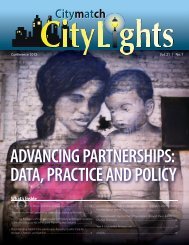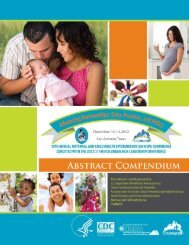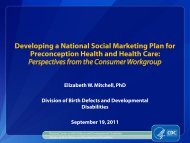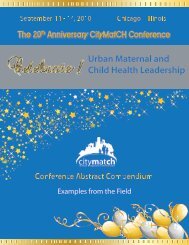Conference Abstract Compendium Examples from the ... - CityMatCH
Conference Abstract Compendium Examples from the ... - CityMatCH
Conference Abstract Compendium Examples from the ... - CityMatCH
You also want an ePaper? Increase the reach of your titles
YUMPU automatically turns print PDFs into web optimized ePapers that Google loves.
2009 <strong>CityMatCH</strong> Urban MCH Leadership <strong>Conference</strong>ACCOMPLISHMENTS/RESULTSIn <strong>the</strong> first seven months, <strong>the</strong> program has trained over 254 participants which reaches roughly 81% of allchildren birth to five in a three county region of Oregon. A universal referral and release form has beendeveloped for all Oregon counties –greatly improving <strong>the</strong> communication between <strong>the</strong> differentstakeholders. The majority of providers have implemented at least one screening tool with over halfimplementing two screening tools in <strong>the</strong>ir practices. Post-training data is currently being analyzed <strong>from</strong><strong>the</strong> first round of trainings.BARRIERS• Gaining access to primary care was a huge barrier – partnering with <strong>the</strong> local AAP chapter and bringing<strong>the</strong> training (and dinner) into <strong>the</strong> practice helped overcome this barrier.• Overcoming <strong>the</strong> cultural barriers across disciplines was also significant – <strong>the</strong> community panels createda dialogue where participants began to share <strong>the</strong>ir frustrations and opportunities.• Continued funding is a barrier until <strong>the</strong> State steps up to support this effort.LESSONS LEARNEDPhysicians and staff are receptive to screening for developmental disabilities and autism and this type ofhands on training is well received. Lack of physician knowledge of community resources and <strong>the</strong> referralprocesses is significant and widespread. The lack of a universal referral and information release processhas been an additional barrier for physicians and community providers working toward a coordinated caremodel. Public health home visitors are often seeing <strong>the</strong> same children and <strong>the</strong>re is very little sharing ofinformation/data across <strong>the</strong>se disciplines. Streng<strong>the</strong>ning developmental screening and linkages tocommunity referral in primary care will increase our effectiveness in early identification of challenges.This approach also streng<strong>the</strong>ns working relationships across disparate professional groups to increaseaccess to appropriate services for families with children struggling with suspectedsocial/emotional/developmental delays.INFORMATION FOR REPLICATIONThe approximate annual budget for START is $100,000, which includes <strong>the</strong> staff needed to coordinate,physician stipends to deliver <strong>the</strong> training, materials, meals, and travel. This is a very modest amount toinfluence an important public health outcome such as this.The seed monies for this initiative have come <strong>from</strong> a local managed care organization which managesMedicaid in our region. In states where this type of effort has been sustained, it has included a mix ofMedicaid and private funds.American Academy of Pediatrics-state chapter, Medicaid, Maternal Child Health - State and county, EarlyIntervention (special education), Child Care Resource and Referral, Mental Health providers who workwith young children, Oregon State Early Childhood Matters Council and Commission on Children andFamilies.145







